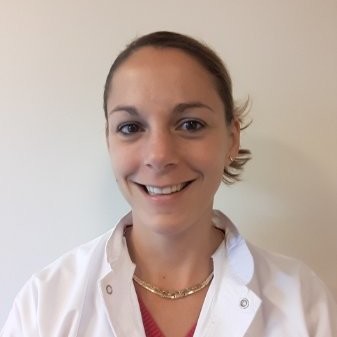
PAILLARD Mélanie
- Position: Researcher
- Phone : 04.78.78.56.10
- Mail : melanie.paillard@univ-lyon1.fr
Team member :
About
Mélanie Paillard is an Inserm Associate Researcher in the IRIS (Ischemia-Reperfusion Injury Syndromes) team at CarMeN laboratory in Lyon. Her main research focus consists in pursuing a translational research for the development of new protective strategies targeting mitochondria during cardiometabolic diseases (including diabetic cardiomyopathy, HFpEF, myocardial infarction and stroke). Mélanie graduated from the Ecole Normale Supérieure of Lyon in 2008 and obtained her PhD in Physiology in 2012 from the University Claude Bernard Lyon1. Her PhD work focused on the role of some mitochondrial functions in the mechanisms of cardiomyocyte death during ischemia-reperfusion, notably the reticulum-mitochondria Ca2+ coupling (Paillard et al., Circulation 2013). Mélanie joined the MitoCare center of Pr Gyorgy Hajnoczky in 2013 (Philadelphia, USA), supported by postdoctoral fellowships from Fondation pour la Recherche Médicale and the American Heart Association. During her post-doctoral training, her research led to the discovery of the physio-pathological role of MICU1, a key regulator of the mitochondrial uniporter (Antony, Paillard et al., Nat Commun 2016; Paillard et al., Mol Cell 2018), for which she received the Young Bioenergeticist Award in 2017. Thanks to the combination of state-of-the-art techniques in live fluorescent imaging microscopy, proteomic analyses and in vivo mouse models up to the translational level in isolated human cardiomyocytes, she is now conducting a translational research focusing on mitochondrial Ca2+ regulation in the excitation-metabolic coupling, notably in diabetic HFpEF (Dia et al., Basic Res Cardiol 2020) and myocardial infarction (ANR MitoCaRe).
Expertise
- Translational research from molecular mechanisms up to pre-clinical and clinical studies
Awards received
- 2017 : Award of the « Young Bioenergeticist » from the research group « Bioenergetics » of the Biophysical Society
- 2013-2019: Postdoctoral fellowships (Fondation pour la Recherche Médicale, American Heart Association, Fondation Lefoulon-Delalande)
Current funding
- Mitocardia Leducq network 2017: Targeting Mitochondria to Treat Heart diseases
- ANR JCJC MitoCaRe 2021:Role of the MICU1-MCU interaction in the Mitochondrial Ca2+ Regulation during ischemia-reperfusion
- Fondation de France 2020: Clinical and pre-clinical study of the the alteration of the functional coupling between reticulum and mitochondria in diabetic cardiomyopathy: activation of the mitochondrial uniporter as a therapeutic strategy
- Fondation de l’Avenir 2021: CRISPY: New cytokines and cellular markers of the early inflammatory response during myocardial infarction
5 major publications:
- Reduced reticulum-mitochondria Ca2+ transfer is an early and reversible trigger of mitochondrial dysfunctions in diabetic cardiomyopathy. Dia M, Gomez L, Thibault H, Tessier N, Leon C, Chouabe C, Ducreux S, Gallo-Bona N, Tubbs E, Bendridi N, Chanon S, Leray A, Belmudes L, Couté Y, Kurdi M, Ovize M, Rieusset J, Paillard M. Basic Res Cardiol. 2020 Nov 30;115(6):74.
- MICU1 interacts with the D-ring of the MCU pore to control its Ca2+ flux and sensitivity to Ru360. Paillard M, Csordás G, Huang KT, Várnai P, Joseph SK and Hajnóczky G, Mol Cell, 2018 Nov 15;72(4):778-785.e3.
- Tissue-specific mitochondrial decoding of cytoplasmic Ca2+ signals is controlled by the stoichiometry of MICU1/2 and MCU. Paillard M, Csordás G, Szanda G, Golenár T, Debattisti V, Bartok A, Moffat C, Seifert EL, Spät A and Hajnóczky G, Cell Rep. 2017 Mar 7;18(10):2291-2300.
- MICU1 regulation of mitochondrial Ca2+ uptake dictates survival and tissue regeneration. Antony AN*, Paillard M*, Moffat C*, Juskeviciute E, Bolon B, Rubin E, Csordás G, Seifert EL, Hoek JB and Hajnóczky G, Nat Commun. 2016 Mar 9;7:10955.
- Depressing mitochondria-reticulum interactions protects cardiomyocytes from lethal hypoxia-reoxygenation injury. Paillard M, Tubbs E, Thiebaut P-A, Gomez L, Fauconnier J, Crola Da Silva C, Teixeira G, Mewton N, Belaidi E, Durand A, Abrial M, Lacampagne A, Rieusset J, Ovize M, Circulation 2013 Oct 1;128(14):1555-65.

